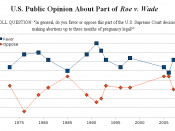There are several forms of privacy invasions happening in the workplace everyday. The creator has found several ways employees? rights are being violated. They are the following; background checks, finger printing, information technology surveillance, interrogations-including asking questions about personal life, metal detectors, search and seizures, and testing (alcohol, drug, genetic, lie detector testing, medical, physical and psychological).The person behind this thesis choose to narrow it down to one form of privacy invasion; it is information technology (IT) surveillance.
Because there are not enough verdicts shielding employee's privacy rights, recent technology effortlessly permits employers to invade employee's privacy rights in the workplace. According to Lichtash's (Lichtash, 2004, p. 33) article, the amended federal Wire Tap Act by the Electronic Communication Privacy Act of 1986 ?prohibits the interception, recording and disclosure of ?any wire, oral, or electronic communication? unless the parties to the communication consent, either explicitly or implicitly.? However, a written statement from Mr.
Strauss (Strauss, 2006, p. 18) states, ?Because electronic communications are so relatively new, there is not a lot of law to go on. On a federal level, while there is both a constitutional ?right to privacy? and a right against unreasonable ?searches are seizures,? but by and large they doesn?t apply to the workplace. [sic]?. Concluding, information technology allows employers to invade employees? privacy rights in the workplace (Strauss, 2006).
The author found it ironic that the amended federal ?Wire Tap Act by the Electronic Communication Privacy Act of 1986 prohibits the interception, recording and disclosure of any wire, oral, or electronic communication? (Strauss, 2006, p. 18). Certainly, email is electronic mail. So, why is it not covered under this amendment? The Wire Tap act clearly states, ??prohibits the interception, recording and disclosure of any wire, oral, or electronic communication.?(Strauss, 2006, p. 18).
Current machinery allows communications...



Thoughts
This paper has good information and used the references to describe the privacy rights of employees.
0 out of 0 people found this comment useful.